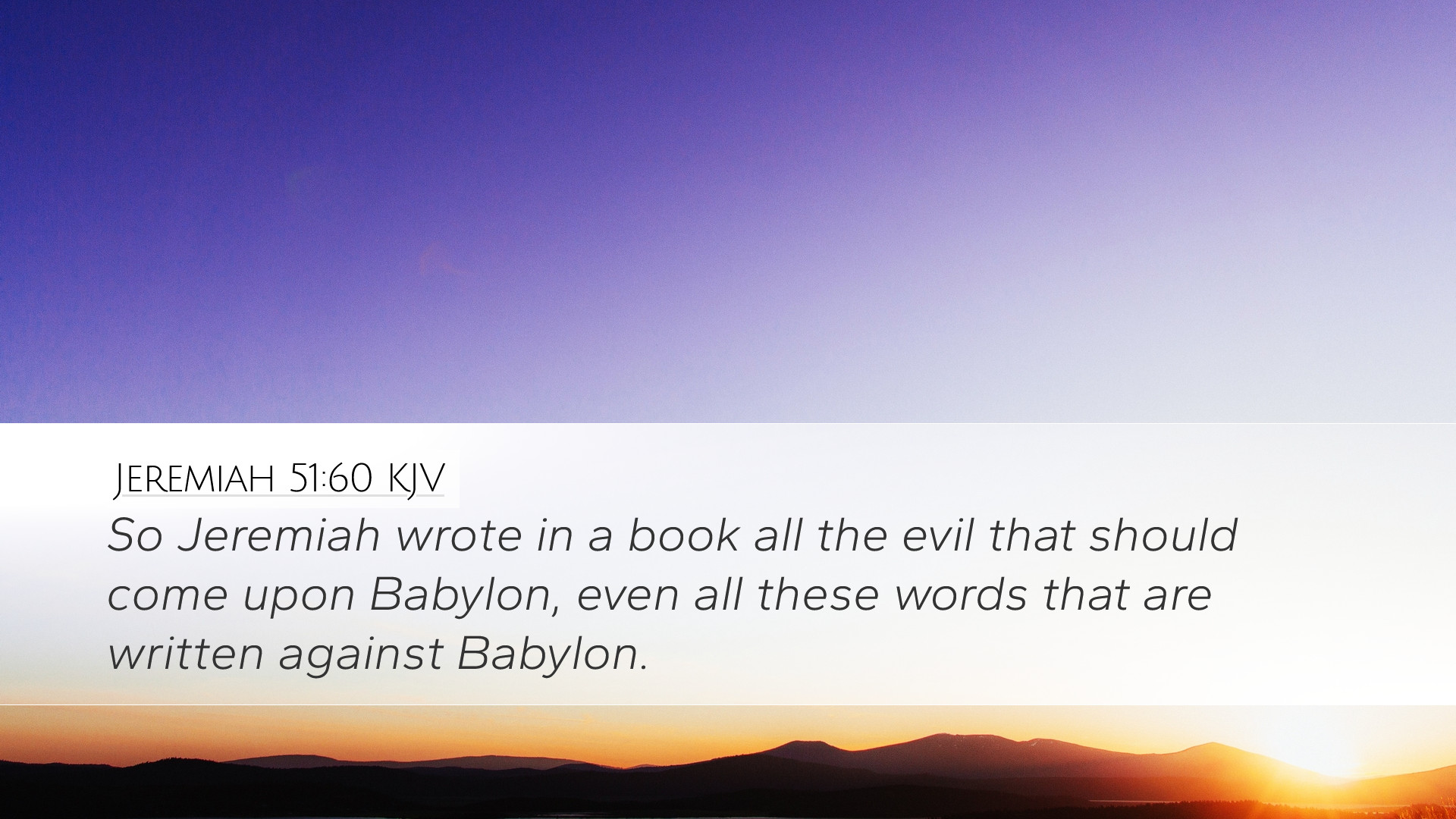Commentary on Jeremiah 51:60
Introduction
The verse Jeremiah 51:60 is a pivotal moment in the prophetic literature, capturing the essence of God's judgment against Babylon. In this commentary, we will distill insights from classical commentaries by Matthew Henry, Albert Barnes, and Adam Clarke to provide a comprehensive understanding of this significant text.
Text of Jeremiah 51:60
"And Jeremiah wrote in a book all the evil that should come upon Babylon, even all these words that are written against Babylon."
Context of the Passage
The book of Jeremiah is imbued with themes of judgment and hope. Jeremiah's prophetic ministry occurred in a tumultuous period for Judah, with Babylon's encroachment symbolizing God's chastisement for Israel's abandonment of covenant faithfulness. As we delve into verse 60, we recognize that it signals not only the culmination of Jeremiah's pronouncements against Babylon but also serves as a reminder of God’s sovereignty over all nations.
Insights From Commentary
1. Matthew Henry's Perspective
Matthew Henry emphasizes the role of delivering God's message boldly, even when it pertains to the fall of a mighty empire like Babylon. He suggests that Jeremiah's act of writing "all the evil" shows divine diligence in documenting judgment, affirming that God is meticulous in His decrees. The contents of this book serve as a testament to God’s absolute authority and His judgment upon nations that turn against Him.
2. Albert Barnes' Analysis
Albert Barnes provides a literary perspective, noting the significance of the written word in prophetic ministry. He highlights that "all these words" underscores the completeness of God's revelation—no evil deed of Babylon escapes His notice. Barnes draws attention to how the recording of Babylon's doom is a literary device that serves both as a warning to other nations and a reassurance to the faithful remnant of Israel, who are being oppressed during Babylon's reign.
3. Adam Clarke's Commentary
Adam Clarke offers a deeper theological reflection on the implications of writing this prophecy. He posits that Jeremiah's act is not merely historical but bears profound eschatological significance. Clarke elucidates that the prophecy contained within this text reflects the ultimate justice of God, drawing parallels to how the downfall of empires serves as a precursor for the establishment of God’s eternal kingdom. He also emphasizes the personal anguish Jeremiah felt in delivering such messages, highlighting the intersection of divine judgment and human emotion.
Theological Implications
The theological implications of Jeremiah 51:60 are numerous. It illustrates the God who is aware and cares deeply about the actions of nations. The act of writing serves multiple purposes—preservation, proclamation, and preparation. Beyond judgment, it is a call to repentance and a reminder of God's patience and sovereign will.
- God's Sovereignty: The verse highlights God's control over history; kingdoms rise and fall under His command.
- Record of Judgment: The documentation signifies that every wrongdoing is noted, demonstrating God's justice.
- Encouragement for the Faithful: Amidst despair, God’s declarations provide assurance to His people that He remembers them and their plight.
Application for Today
For pastors and theological students, this verse serves as a compelling reminder of the necessity of proclaiming God’s word in its entirety. Similarly, scholars can reflect on what it means for contemporary nations to heed the call of repentance. The message found in Jeremiah 51:60 transcends its historical context and remains relevant as a warning and an encouragement today.
- Pastoral Application: Preach with boldness on the issues of justice, accountability, and God’s reign. Steer congregations toward a culture of repentance and awareness.
- Theological Reflection: Explore the complexities of divine judgment and grace. How do we reconcile God’s patience with His eventual justice?
- Scholarly Analysis: Engage in critical discussions on the implications of prophetic writing throughout the Old Testament and its relevance today.
Conclusion
Jeremiah 51:60 is more than a historical account; it is a rich tapestry of God’s judgments, human emotion, and divine sovereignty. The combined insights from the early commentaries shed light on the importance of documenting divine pronouncements and the nature of God's interaction with nations. As we study this verse, let us reflect on our own lives and nations, seeking to align ourselves with God's will, embracing His call to holiness, and proclaiming His truths in a world that often finds itself at odds with His ways.


